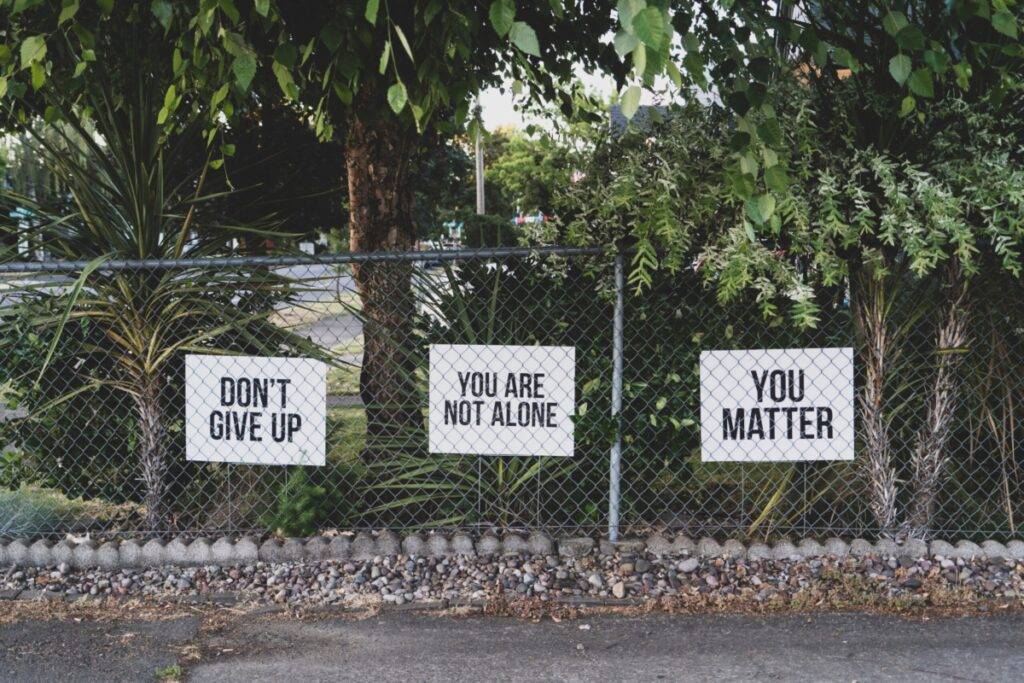Have you ever wondered, “Why do people stare at me?” You’re not alone. Many individuals experience the discomfort of unwanted attention in public spaces, feeling like a target for prying eyes. This article aims to help you understand the reasons behind staring and how to turn it into a source of confidence. We’ll discuss the importance of perspective and mindset in dealing with unwanted attention, making this topic relevant to a wide range of readers.
Table of Contents
Understanding Why People Stare at Me and Turning It into Confidence
One reason why people may stare at you is curiosity. It’s essential to realize that this isn’t necessarily negative. By recognizing that people’s interest in you might not always stem from malicious intent, you can reframe the situation in a more positive light. Understanding the reasons behind people’s stares can help you feel more empowered and better equipped to handle their attention.
Emphasizing the Importance of Perspective and Mindset
When asking, “Why do people always stare at me?”, it’s crucial to consider the role of personal biases and assumptions. Often, we project our insecurities onto others, which can lead us to misinterpret their motives. By becoming more self-aware and open-minded, we can develop a healthier perspective on the attention we receive.
Relevance of the Topic for a Wide Range of Readers
This topic resonates with many people, from those who feel like people are staring at them all the time to those who simply want to understand the psychology behind staring. By exploring the reasons why people stare and offering strategies for coping, this article aims to provide valuable insights for anyone seeking to gain confidence and resilience in the face of unwanted attention.
So, the next time you find yourself asking, “Why do people stare at me in public?”, remember that you have the power to change your mindset and transform the situation into a positive experience. By understanding the reasons behind people’s stares and adopting a proactive approach, you can turn unwanted attention into a source of strength and self-assurance.
Understanding the Psychology Behind Staring

Have you ever wondered, “Why do people stare at me?” While it’s natural to feel self-conscious when you’re on the receiving end of someone’s gaze, it’s essential to recognize that there are various reasons for this behaviour. In this section, we’ll explore the psychology behind staring, focusing on the human tendency to stare and the reasons why people might do so.
A. The Human Tendency to Stare
- Evolutionary perspective
From an evolutionary standpoint, staring is a deeply ingrained behaviour. Our ancestors needed to be highly attentive to their surroundings to identify potential threats, opportunities, and social cues. As a result, humans have developed a natural inclination to observe others closely. So, when you ask, “Why do people stare at me?”, it’s essential to remember that this tendency is a fundamental aspect of human nature.
- Social and cultural factors
Social and cultural factors also play a significant role in shaping people’s staring behaviour. Different societies have varying norms regarding eye contact and personal space, which can affect how we perceive and respond to staring. Understanding these factors can help you gain a broader perspective on why people stare and how to interpret their intentions.
B. Reasons Why People Might Stare

- Curiosity
One of the most common reasons why people stare is curiosity. When something or someone catches our eye, it’s natural to want to learn more. However, this curiosity isn’t always negative. It’s important to keep in mind that just because someone is staring at you doesn’t necessarily mean they have ill intentions.
- Attraction
Another possible explanation for why people stare is attraction. When someone finds you physically or emotionally appealing, they may be more likely to fix their gaze on you. In this case, the attention you receive could be viewed as a compliment rather than a cause for concern.
- Disapproval or judgment
Unfortunately, not all staring is innocent. Sometimes, people stare because they disapprove of or judge something about your appearance or behaviour. While this can be hurtful, it’s crucial to remember that you can’t control other people’s opinions, and their judgments often say more about them than about you.
- Inattention or zoning out
Finally, it’s worth considering that some people may stare unintentionally. When our minds wander, our eyes can become unfocused, and we might appear to be staring at someone when, in fact, we’re simply lost in thought. So, when you ask, “Why do people stare at me?”, it’s essential to remember that not all stares are intentional or meaningful.
By understanding the various reasons why people might stare, you can gain a better perspective on the attention you receive and develop strategies for dealing with it. In the following sections, we’ll explore ways to reframe your thoughts about staring, build self-confidence, and turn unwanted attention into a source of personal growth.
So, the next time you find yourself wondering, “Why do people stare at me in public?”, remember that there are many potential explanations for this behaviour. By recognizing that staring is a complex phenomenon shaped by evolutionary, social, and cultural factors, as well as individual intentions, you can feel more empowered and better equipped to handle the attention you receive. And when life feels overwhelming, remember that you’re not alone—check out our blog post on why life can sometimes feel like it sucks, and how to cope with it.
In conclusion, understanding the psychology behind why people stare can help you gain perspective and feel more confident in situations where you might be the centre of attention. By acknowledging the various reasons for staring and considering the broader context, you can develop a healthier mindset when it comes to dealing with unwanted attention. As you continue to explore this topic and apply the strategies discussed in this article, you’ll be well on your way to transforming stares into a source of personal growth and empowerment.
Remember that you are not alone in your journey to overcome the challenges posed by unwanted attention. Many people have faced similar experiences and have emerged stronger and more resilient as a result. By embracing the strategies and insights provided in this article, you can turn the stares of others into a catalyst for positive change, growth, and self-confidence. So, the next time you find yourself asking, “Why do people stare at me?”, remember that the power to change your mindset and transform the situation lies within you.
Gaining Perspective: Reasons to Reinterpret Staring
When confronted with the question, “Why do people stare at me?”, it’s crucial to take a step back and reevaluate the situation from a broader perspective. By acknowledging our personal biases and assumptions, understanding that staring is not always negative, building empathy, and emphasizing self-reflection, we can develop a healthier mindset when dealing with unwanted attention.
A. Recognizing Personal Biases and Assumptions
Our perception of staring is often shaped by our personal experiences, beliefs, and cultural background. It’s essential to recognize these biases and assumptions when trying to understand why people stare at us. When we ask, “Why do people stare at me?”, we should consider whether our interpretation is based on objective evidence or subjective feelings.
B. Understanding That Staring Is Not Always Negative
As previously discussed, there are many reasons why people stare, and not all of them are negative. It’s essential to remember that curiosity, attraction, and even inattention can cause someone to stare at you. By acknowledging the diverse range of motivations behind staring, you can develop a more nuanced understanding of why people stare at you and how to respond effectively.
C. Building Empathy and Realizing That Everyone Is Subject to Being Stared At
Remember that everyone, at some point, has been the subject of someone else’s gaze. By developing empathy and putting yourself in others’ shoes, you can gain valuable insights into why people stare and how to handle these situations with grace and confidence. Moreover, building empathy can help you realize that you’re not alone in your experience, which can be a significant source of comfort and support.
D. Emphasizing the Importance of Self-Reflection
Self-reflection is a powerful tool for personal growth and development. By examining our thoughts and feelings about staring, we can gain valuable insights into our beliefs, assumptions, and biases. In turn, this can help us develop a more balanced and objective perspective on why people stare at us. Consider using productive procrastination techniques to dedicate time to self-reflection and personal growth.
In conclusion, reinterpreting staring from a broader perspective can help you better understand why people stare at you and develop effective strategies for dealing with unwanted attention. By recognizing personal biases, understanding the diverse range of motivations behind staring, building empathy, and emphasizing self-reflection, you can transform the question “Why do people stare at me?” into an opportunity for personal growth and self-discovery. Remember to check out Changing Faces’ advice on coping with other people’s reactions for more insights and support.
Strategies for Handling Unwanted Attention
Dealing with the question, “Why do people stare at me?” can be challenging, but there are several strategies to help you navigate these situations with confidence and grace. By developing self-confidence, improving communication skills, and focusing on personal growth, you can transform unwanted attention into a source of empowerment and personal development.
A. Developing Self-Confidence
Building self-confidence is a crucial aspect of handling unwanted attention. By focusing on your strengths, practising self-affirmation, and surrounding yourself with a positive support network, you can face the question “Why do people stare at me?” with courage and self-assurance.
- Identifying Personal Strengths: Make a list of your talents, skills, and qualities that make you unique. Recognizing your strengths can boost your self-esteem and help you respond confidently to the question, “Why do people stare at me?”
- Practising Self-Affirmation: Develop a habit of repeating positive affirmations to yourself every day. This practice can reinforce your self-worth and help you maintain a positive mindset when faced with the question, “Why do people stare at me?”
- Building a Positive Support Network: Surround yourself with friends, family, and mentors who encourage and uplift you. A strong support system can help you navigate situations when you feel like people are staring at you.
B. Improving Communication Skills
Effective communication is essential in addressing the question, “Why do people stare at me?” By using body language effectively, asserting yourself, and engaging in constructive conversations, you can manage unwanted attention and build connections with others.
- Using Body Language Effectively: Your body language can influence how others perceive you. Adopting a confident posture and maintaining eye contact can help you assert yourself when faced with the question, “Why do people stare at me?”
- Assertiveness and Setting Boundaries: Learn to assert your boundaries and communicate your needs clearly. By doing so, you can address the question, “Why do people stare at me?” while maintaining your dignity and self-respect.
- Engaging in Constructive Conversations: If someone’s stare makes you uncomfortable, try initiating a conversation with them. This approach can help you understand their perspective and may even lead to a positive connection.
C. Focusing on Personal Growth
Personal growth is vital for managing the question, “Why do people stare at me?” By embracing your uniqueness, developing resilience, and pursuing your interests, you can transform unwanted attention into opportunities for self-improvement.
- Embracing Uniqueness and Individuality: Recognize and celebrate the qualities that set you apart from others. By embracing your individuality, you can confidently address the question, “Why do people stare at me?” and turn it into a source of pride.
- Developing Resilience and Adaptability: Cultivate resilience by learning to bounce back from challenging situations. This skill will help you navigate the question, “Why do people stare at me?” with grace and composure.
- Pursuing Personal Interests and Goals: Focus on your passions and aspirations. By dedicating time and energy to the things that matter to you, you can create a fulfilling life that transcends the question, “Why do people stare at me?”
In summary, dealing with unwanted attention requires a multifaceted approach that involves building self-confidence, improving communication skills, and focusing on personal growth. By adopting these strategies, you can face the question, “Why do people stare at me?” with confidence and turn it into an opportunity for self-development. For more insights, check out this article on handling stares and unwanted attention.
By implementing these strategies, you can transform the way you perceive unwanted attention and use it as a catalyst for personal growth. Rather than feeling self-conscious or anxious when faced with the question, “Why do people stare at me?” you can choose to view it as an opportunity to develop your self-confidence, strengthen your communication skills, and focus on your personal development. As you grow more comfortable and confident in your own skin, you’ll find that the question, “Why do people stare at me?” becomes less significant and impactful on your overall well-being.
Remember that everyone faces unwanted attention at some point in their lives. By adopting a proactive and resilient mindset, you can turn these experiences into opportunities for personal growth and self-improvement. So next time you find yourself wondering, “Why do people stare at me?” take a deep breath, remind yourself of your strengths, and continue to embrace your unique qualities with confidence and pride.
Turning Unwanted Attention into Confidence
Transforming the way you perceive unwanted attention can be a powerful tool for personal growth. When faced with the question, “Why do people stare at me?”, you can choose to reinterpret the situation and leverage that attention to build connections, and networks, and promote positive change. Here are some strategies to help you turn unwanted attention into confidence:
A. Reinterpreting Stares as Opportunities for Personal Growth
Rather than perceiving stares as negative, try to view them as opportunities for personal growth. When you wonder, “Why do people stare at me?”, consider the following:
- Use attention as a chance to practice assertiveness and self-confidence.
- Reflect on how you can improve your communication skills to address staring or unwanted attention.
- Evaluate whether there’s an opportunity to learn something new about yourself or others.
B. Leveraging Attention to Build Connections and Networks
Unwanted attention can be a chance to build connections and expand your social network. If you’re asking yourself, “Why do people stare at me?”, consider these opportunities:
- Initiate conversations with people who stare and try to find common ground or shared interests.
- Attend events or join groups where you might attract attention, but also have the chance to network and meet new people.
- Use attention as a platform to showcase your skills, expertise, or passion, attracting like-minded individuals.
C. Using the Spotlight to Promote Positive Change and Social Awareness
If you find yourself in the spotlight due to unwanted attention, use this opportunity to promote positive change and raise social awareness. When confronted with the question, “Why do people stare at me?”, think about how you can make a difference:
- Share your story or experiences with others to foster understanding and empathy.
- Advocate for social causes or issues that are close to your heart, using the attention to raise awareness and drive change.
- Encourage others to embrace their uniqueness and stand up against judgment or discrimination.
In conclusion, dealing with the question, “Why do people stare at me?” doesn’t have to be a negative experience. By reinterpreting stares as opportunities for personal growth, leveraging attention to build connections, and using the spotlight to promote positive change, you can turn unwanted attention into confidence and empowerment.
Real-Life Examples and Stories
Throughout history, countless individuals have faced the question, “Why do people stare at me?” and used it as an opportunity for personal growth and empowerment. Let’s explore some inspiring stories, expert advice, and interviews that highlight how people have successfully turned unwanted attention into confidence.
A. Inspiring Stories of Individuals Who Have Overcome Unwanted Attention
- Lizzie Velasquez: Born with a rare genetic condition that prevents her from gaining weight, Lizzie has faced constant stares and comments throughout her life. Instead of letting it bring her down, she became a motivational speaker, author, and anti-bullying activist, inspiring millions with her message of self-acceptance and resilience.
- Winnie Harlow: As a model with vitiligo, a skin condition that causes depigmentation, Winnie has dealt with stares and judgment throughout her career. By embracing her unique appearance and working to break down beauty stereotypes, she has become an influential voice for body positivity and self-love.

B. Tips and Advice from Experts and Psychologists
When asking, “Why do people stare at me?”, it’s helpful to seek guidance from experts and psychologists. Here are some tips:
- Focus on building self-confidence: Develop a strong sense of self-worth by identifying your strengths, practising self-affirmation, and surrounding yourself with positive support.
- Improve communication skills: Learn how to use body language effectively, set boundaries, and engage in constructive conversations to navigate situations where you feel stared at.
- Practice mindfulness and self-compassion: Cultivate a non-judgmental awareness of your thoughts and feelings, and treat yourself with kindness and understanding when faced with unwanted attention.
C. Interviews with People Who Have Successfully Turned Unwanted Attention into Confidence
Hearing from others who have faced the question, “Why do people stare at me?” and emerged stronger can be inspiring and empowering. In a recent interview, several individuals shared their experiences of overcoming unwanted attention by:
- Building a supportive community of friends and mentors who understand their experiences and offer encouragement.
- Seeking professional help to develop coping strategies and build resilience.
- Advocating for change and raising awareness about the issues they face, thereby turning the spotlight into a powerful tool for positive impact.
By learning from these real-life examples and stories, you can develop the skills and mindset needed to turn unwanted attention into confidence, growth, and empowerment.
Conclusion
As we reach the end of our exploration into the question, “Why do people stare at me?”, it’s essential to recap the main points discussed throughout this article:
- Understanding the psychology behind staring: Recognizing that staring is a natural human behaviour influenced by evolutionary, social, and cultural factors.
- Gaining perspective: Reinterpreting staring by recognizing personal biases, realizing that not all stares are negative, building empathy, and emphasizing the importance of self-reflection.
- Strategies for handling unwanted attention: Developing self-confidence, improving communication skills, and focusing on personal growth.
- Turning unwanted attention into confidence: Reinterpreting stares as opportunities for personal growth, leveraging attention to build connections, and using the spotlight to promote positive change.
- Real-life examples and stories: Learning from inspiring individuals, expert advice, and interviews with those who have successfully turned unwanted attention into confidence.
Throughout this article, we’ve aimed to provide insights and practical strategies to help you build confidence and resilience when faced with unwanted attention. The journey to embracing personal growth and turning stares into a positive experience may be challenging, but it is undoubtedly rewarding.
As you navigate your own experiences with the question, “Why do people stare at me?”, remember to approach it with curiosity, empathy, and a growth mindset. Acknowledge your feelings and recognize the power you have to shape your reactions and redefine the narrative. Surround yourself with supportive individuals, seek professional guidance when needed, and never forget that personal growth is an ongoing process.
So, the next time you find yourself asking, “Why do people stare at me?”, take a deep breath, hold your head high, and remind yourself of your worth and your ability to turn any challenge into an opportunity for growth and empowerment. Embrace your unique qualities and experiences, and know that you are not alone on this journey.
FREQUENTLY ASKED QUESTIONS Q&A
-
Why do random people stare at me?
Random people may stare at you for various reasons such as curiosity, attraction, or inattention. It’s essential to remember that “Why do people stare at me?” is a question many people ask, and it’s not always a negative reflection on you or your appearance. Sometimes, it may be due to their own thoughts, habits, or even social conditioning. Rather than focusing on the reasons behind the stares, try to maintain a positive attitude and self-confidence in handling these situations.
-
When a person stares at you what does that mean?
When a person stares at you, it can mean various things, from curiosity and attraction to disapproval or simple inattention. Understanding “Why do people stare at me?” requires considering the context and the individual’s behaviour. Remember that the meaning behind stares can differ from person to person, and not all stares carry a negative connotation.
-
Why do strangers stare at me in public?
Strangers may stare at you in public due to curiosity, attraction, judgment, or even inattention. When asking “Why do people stare at me?” it’s crucial to understand that various factors can influence people’s behaviour, and their reasons for staring might not be directly related to you. Focus on maintaining self-confidence and a positive attitude when encountering unwanted attention from strangers.




Pingback: Why Does Nobody Like Me? Gaining Perspective and Cultivating Genuine Connections - Revival at 30